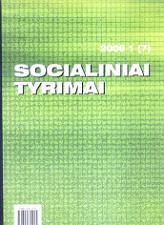ES struktūrinė parama Lietuvoje: pirmieji vertinimai (1)
Support of EU Structural Funds in Lithuania: First Evaluation (1)
Author(s): Gediminas MačysSubject(s): Social Sciences
Published by: VšĮ Šiaulių universiteto leidykla
Keywords: The EU Structural Funds; the methodological basis and techniques of evaluation; an evaluation of structural actions at a regional level of Lithuania; an impact of structural actions on the territorial cohesion; the long-term benefits of Structural Funds.
Summary/Abstract: EU structural funds play a crucial role improving social and economic cohesion of Lithuania. Amount of investment from Structural Funds of the EU is substantial and consequently EU legislation requires appraisal of structural funds. However, although systematic monitoring and evaluation framework is available at the national level and project level, a rigorous and systematic method of quantifying socio-economic impact of Structural Funds intervention on the local economies has not been developed to the same extent. Methodological basis and techniques of evaluations are discussed in the paper. First findings on the evaluation of structural actions at a regional level of Lithuania, their impact on the territorial cohesion are analyzed in this paper. Findings indicate a higher investment in infrastructure than in human capital and knowledge economy development, also the development in already strong cities of the country. This signals that growth generated by cohesion support might lead to widening regional disparities. For least-developed regions these funds should help to consolidate local resources and facilitate efforts to build up key infrastructure, human and physical capital that will help to guarantee their future economic success. At the same time, more-developed regions and big cities of Lithuania are likely in need to employ a wider range of different interventions addressing specific market failures that holding back their performance. The direct benefits arising from Structural Funds are only a part of a much wider picture. The real long-term benefits of Structural Funds are to be associated with the way in which each local economy of region responds to opportunities arising in the rest of the country and the EU as a result of the Single Market rather than Structural Funds in isolation. This emphasizes a need to work within the wider “global theory” of macro modeling rather than the narrower “theory of action” that tends to motivate policy makers focused on the role of specific Structural Funds programmes.
Journal: Socialiniai tyrimai
- Issue Year: 2006
- Issue No: 7
- Page Range: 75-82
- Page Count: 8
- Language: Lithuanian

